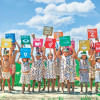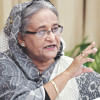Bangladesh-UK for long-term commitment to SDGs
Bangladesh and the United Kingdom have reiterated their long-term commitment to the Sustainable Development Goals.
The countries came up with the commitment at the third Strategic Dialogue between Bangladesh and the UK held today at the State Guest House Padma in Dhaka, according to a press release of the Ministry of Foreign Affairs.
The UK also set out how the development partnership with Bangladesh will evolve to support further progress on climate change in the economic, social, and governance spheres – aligned with government priorities, it said.
The Strategic Dialogue was led by Bangladesh Foreign Secretary (Senior Secretary) Md Shahidul Haque and British FCO Permanent Under-Secretary Sir Simon McDonald.
They also discussed ways for Bangladesh to reach the SDGs by 2030.
Sir Simon McDonald and Md Shahidul Haque launched the Bangladesh-UK Strategic Dialogue together at Dhaka in 2017.
The dialogue demonstrated the full depth of the Bangladesh-UK relationship and involved exchange of views on political relations, celebration of the 50th anniversary of the establishment of diplomatic relations, trade and investment, education and skills, good governance and human rights, the future development partnership, migration and security and defence cooperation, and regional and global issues of mutual interest, it said.
The issue of finding a durable solution to the Rohingya crisis figured high in the discussions.
“I was glad to attend the third Strategic Dialogue with my Bangladesh counterpart Md Shahidul Haque in Dhaka. We held good discussions across a range of high priority areas for both the UK and Bangladesh,” Sir Simon McDonald commented.
.@mshaquemofabd presented me with picture of rickshaws at end of productive 3rd UK/Bangladesh Strategic Dialogue: a generous memento from @MoFA_Bangladesh. My more modest present sits in front of my host on conference table (magnifying glass required...) pic.twitter.com/kGw5GywCKA
— Sir Simon McDonald (@SMcDonaldFCO) April 24, 2019
“It has been a very productive and fruitful exchange of notes... we discussed all aspects of our relations- bilateral, regional and multilateral. We have a long lasting and deep trusted relationship with the people and the government of the UK since our Independence,” Foreign Secretary Md Shahidul Haque said.
The meeting began with both sides welcoming the progress made in bilateral relations, with a briefing on their countries’ political developments domestically and internationally.
As fellow Commonwealth members, the UK and Bangladesh stood in solidarity with and condemned the recent terrorist attacks in New Zealand and Sri Lanka that claimed scores of innocent lives and agreed to continue to cooperate on security, countering terrorism and violent extremism to safeguard their citizens and global humanity from this menace.
Both sides stressed the importance of good governance, human rights and media freedom for any functioning democracy and also for Bangladesh’s economic and social development.
The UK expressed its appreciation of Bangladesh hosting over one million forcibly displaced Rohingya refugees. Bangladesh also welcomed the UK’s efforts in playing a leading role at the UN Security Council, and requested the UK’s continued global leadership in ensuring international efforts in all facets of this crisis including accountability on the part of Myanmar for alleged atrocities committed against the Rohingyas.
Sir Simon McDonald highlighted that the UK is the second largest provider of humanitarian assistance to the Rohingya crisis and reiterated the UK’s long-term commitment to supporting Bangladesh in its humanitarian response and the voluntary, safe, dignified and sustainable return of the Rohingyas to Myanmar.
Bangladesh stressed the importance of an efficient decision-making process for UK visa applications for its nationals, particularly for students and businesses. The UK restated its commitment to maintain a high-quality service for Bangladeshi nationals at the visa application centres in Dhaka and Sylhet.
The UK under-secretary highlighted that the number of visa applicants from Bangladesh is increasing year on year with an average approval rate of around 70 per cent in 2018 – up nearly 10 per cent from 61 per cent in 2016.
UK & Bangladesh held their 3rd Strategic Dialogue in Dhaka today covering a range of areas including climate change, Rohingya crisis, trade & investment, education, good governance & human rights. Dialogue was led by FCO PUS @SMcDonaldFCO & Foreign Secretary Md. Shahidul Haque pic.twitter.com/CQHWq0ExIZ
— Robert C Dickson (@RCDicksonUK) April 24, 2019
The UK welcomed Bangladesh’s continued commitment to take back its citizens who no longer have the right to remain in the UK, and welcomed progress in this regard.
Both sides also discussed the issue of the proposed cross-border Higher Education Rules, which will allow UK universities to operate in Bangladesh if implemented. Bangladesh proposed to open a dialogue in this regard.
Both countries also agreed to consider further ways in which Bangladeshi students could be encouraged to study in the UK. Bangladesh reiterated its request for additional annual Commonwealth, Chevening and other scholarships for its students. The UK noted the increase in Chevening allocation and agreed to consider further requests.
Both countries highlighted the valuable contribution that the Bangladeshi-British diaspora continue to make to British society and agreed that they should continue with efforts to create greater connectivity between the two nations.
Bangladesh highlighted concerns of the British curry industry, on the shortage of skilled workers and the proposed wage structure as part of the future immigration white paper, whilst recognising their significant contribution to the British economy.
Bangladesh also highlighted its efforts to improve performance against the World Bank’s “Doing Business Index” and both sides agreed that trade was an important enabler of development, and that increasing bilateral trade could bring significant benefits to both countries.
Bangladesh informed the UK it will host a ‘Bangladesh Trade and Investment Expo’ in London in October/November this year, and the UK welcomed the efforts in this regard to promote commercial links and investment flows. Both countries agreed to consider encouraging coordination between major chambers of commerce.
The UK and Bangladesh also agreed that the Cricket World Cup in the UK would provide a good platform to celebrate the strong cultural, sporting and people-to-people links that bind the two countries.
Finally, both sides agreed to host events in Bangladesh and the UK in 2021 to mark the 50th anniversary of the establishment of diplomatic relations between the UK and Bangladesh.
The first Strategic Dialogue was hosted by Bangladesh in March 2017 while the second dialogue took place at the UK’s Foreign and Commonwealth Office in March last year.

 For all latest news, follow The Daily Star's Google News channel.
For all latest news, follow The Daily Star's Google News channel. 







Comments